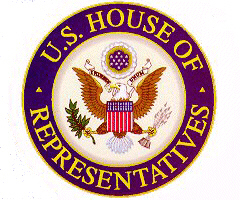![]()

In recent months, the HIV/AIDS epidemic in Africa has finally begun to receive the international attention that a crisis of this magnitude deserves. Over 23 million Africans are infected with HIV, and it is projected that a quarter of southern Africa’s population will die of AIDS. These staggering numbers, and the political and economic instability that they are creating, have prompted the National Security Council to designate HIV/AIDS in Africa as a security threat to the United States.
Although I am supporting the African Growth and Caribbean Initiative Act, my enthusiasm is mixed with disappointment that we have missed this important opportunity to take substantive steps to address this disease. Two HIV/AIDS provisions were excluded from the conference report by the majority. The inclusion of these two provisions in this legislation would have improved access to affordable AIDS drugs and strengthened the international effort to develop an AIDS vaccine. Efforts to treat and eventually eradicate HIV/AIDS are vital to Africa’s economic future. It is no exaggeration to say that HIV/AIDS is decimating the African work force, and the African economic progress that this legislation is designed to support is being placed in jeopardy.
Economic ties between the U.S. and Africa have been growing steadily this decade. African economic development creates new markets for U.S. products and provides resources that this country needs. However, the African economic development that we benefit from in this country is directly threatened by the AIDS epidemic. Professor Jeffrey Sachs, Director of the Harvard Institute for International Development, has stated that "a frontal attack on AIDS in Africa may now be the single most important strategy for economic development." It is estimated that over the next 20 years AIDS will reduce by a fourth the economies of sub-Saharan Africa.
AIDS undermines economic development in several ways. HIV strikes individuals during their most productive years. The disease erodes productivity by increasing absenteeism, and it raises the cost of business through increased need for health benefits and increased costs of recruiting and training new employees as current employees die or become disabled. A 1999 South African study found that the total costs of benefits in that country will increase from 7 percent of salaries in 1995 to 19 percent by 2005 due to AIDS. Some companies are already hiring two employees for every one skilled job because of the likelihood that one will die from AIDS.
I had hoped that two HIV/AIDS provisions would be included in the conference report. First, Senator Kerry and I have proposed a tax credit for qualified research and development costs associated with research on vaccines for malaria, tuberculosis, or HIV. The tax credit equals 30% of total annual qualified R&D investments. In addition, smaller companies could choose to waive the credit and pass it on to their equity investors who finance R&D on one of the priority vaccines. A vaccine is our best hope to bring this epidemic under control and we must accelerate research efforts in order to have any realistic chance of successfully developing a vaccine in the near future.
Second, Senators Feinstein and Feingold proposed a provision designed to improve the access of African nations to generic equivalents of expensive HIV/AIDS drugs. Many years of work and significant federal research dollars have gone into the development of the combination drug therapies that are extending the lives and improving the quality of life for so many people living with HIV/AIDS in this country. We have a moral responsibility to ensure the widest possible access to these treatments and new therapies as they are developed. The benefits that come from our federal investments in scientific and medical research are not meant to be restricted to the wealthy.
The inclusion of these HIV/AIDS provisions would have contributed significantly to vital efforts to treat and eventually halt HIV/AIDS, thereby ensuring a healthier and more prosperous future for the African continent. I hope that the Congress will move swiftly to address this crisis by doing everything we can to treat, educate, prevent, and eventually eradicate HIV/AIDS in both the developed and the developing world.
![]()